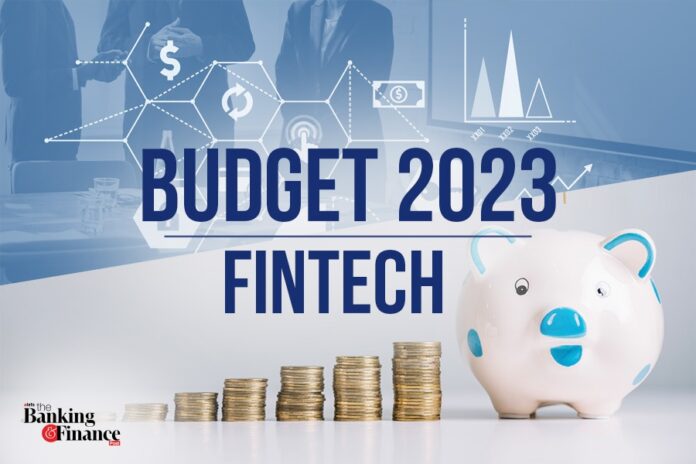Fintech is no longer regarded as a fad. The industry has now evolved into one of the fastest-growing segments of technology, transforming the way financial services are developed. Since 2023 is nearly among us, every industry in the country is bracing for changes that will more or less support its growth trajectory. In this regard, the fintech industry is not an exception. As the new Union Budget for 2023 approaches, leaders in the fintech industry are already presenting wish lists to Finance Minister Nirmala Sitharaman. According to reports, the finance minister met with specialists in the fintech business in the most recent pre-Budget meeting to solicit their feedback on their expectations for the 2019 Budget to accelerate the sector’s growth and income.
According to the Research and Market research, the fintech market is expected to reach Rs 9.2 billion at a CAGR of 24.96% between 2022 and 2027. Indeed, the business is increasing at a rapid speed as a result of new trends and technology, and the market is seeing growth in digital payments. UPI, credit and debit cards are driving the development.
Budget Expectations: Financial Burden Relief: One of the most significant demands businesses have made of the government for the next Budget is that it reduces the financial burden on start-ups in the fintech industry. The industry also wants tax breaks for depreciation on fixed assets used by fintech companies. Similarly, substantial tax relief must be provided to start-up employees to alleviate the dual taxation issue and reduce the financial burden that Employee Stock Ownership Plans (ESOPs) place on employees.
Increase Financial Inclusion Through Digitalization: The fintech industry predicts increased government aid for stronger connections with banks, which will strengthen the current paradigm. Professionals in the business emphasised the importance of creating a level playing field for both online and offline lenders.
Loan Disbursement Regulations: The fintech sector wants the government to enact regulations that encourage collaboration between banks and loan providers to aid customers in obtaining loans in an accessible manner, whether for personal or business needs.
Nirav Choksi, CEO, Co-founder, CredAble, says, “Union Budget 2022 was a landmark digital budget as we saw the introduction of multiple pathbreaking reforms that were invested in accelerating India’s digital revolution. The upcoming budget will be crucial in defining the way forward for the Indian economy. We’re positive that policy changes that will drive continuous growth are in order. We will need to view the budget from the larger macroeconomic perspective of fiscal discipline. That said, we are hoping to see some reforms aimed at spurring the economy such as CAPEX outlays in areas like infrastructure, education, healthcare, and agriculture.
From bringing forth multiple disruptive inventions to the market to job creation across the country, the startup ecosystem is a crucial part of the Indian economy. They are expected to contribute close to 4-5 per cent to India’s GDP in the next three to five years. Today, we see a measured approach to funding with investors warming up to emerging sectors. With all this in the backdrop, 2023 is undoubtedly going to be an exciting year for startups in the country. We look forward to a new set of measures to further solidify India’s startup sector such as the deferment of time of tax payment on Employee Stock Option Plans (ESOPs). Additionally, the government should look at lowering the minimum alternative tax (MAT) for eligible startups to 9 per cent from 15 per cent. Actionable plans for the promotion of ease of doing business for startups should be introduced. To help startups save time and money, a single window for all relevant registrations such as company incorporation and GST certification should be in place. Owing to the funding winter, this year we are likely to see more consolidations in the startup space. As a result, such outbound mergers of startups should be authorised on a tax-neutral basis. Measures to have taxes imposed only on actual liquidation and not on restructuring should be introduced.
We also look forward to digitisation initiatives and support measures that will boost India’s manufacturing ambitions and strengthen our position in the global economy.”
 Sumit Chanda, Founder and CEO, Jarvis Invest, says, “We expect the budget to be favourable for the retail investors. Hopefully, some positive steps should be taken on Capital Gains and income classification which will be a boon for retail investors and traders. We also hope that the FM incentivizes Fintech start-ups, especially those using AI. We can hopefully see positive news for manufacturing, Renewable Energy, Healthcare, and EVs.
Sumit Chanda, Founder and CEO, Jarvis Invest, says, “We expect the budget to be favourable for the retail investors. Hopefully, some positive steps should be taken on Capital Gains and income classification which will be a boon for retail investors and traders. We also hope that the FM incentivizes Fintech start-ups, especially those using AI. We can hopefully see positive news for manufacturing, Renewable Energy, Healthcare, and EVs.
Salaried workers are the main source of the country’s tax revenue and any changes in their taxation will have a significant impact on the economic recovery. There have been murmurs about the tax exemption limit is increased to 5 lakhs from the existing 2.5 lakhs. I would certainly look forward to it. It would mean higher disposable income which can lead to higher consumption and investments. This can boost the economy.
We, as a country, have a very good opportunity to become the manufacturing hub to the world. If the manufacturing sector can be incentivized in some form, this dream can be realized. The Central Government can certainly nudge the State Governments to implement the four labour codes. A reduction in the corporate tax will go a long way in making both the manufacturing and the service sectors grow. Any positive news on these fronts will be a big boost to the markets.”
 Anand Kumar Bajaj, Founder, MD & CEO, PayNearby, says, “Presently, India’s path to financial inclusion is being paved, courtesy of the ground-breaking financial solutions offered by leading fintech players. A robust tech stack riding on the back of a strong distribution network has opened doors for Bharat to access innovative financial products and services. The work that we are doing to make banking services accessible to all in Bharat is a case in point of the one-of-its-kind infrastructure that we have built to relay these services. However, for these services to reach the citizens in the hinterlands needs technology, security, trust and the necessary Government support. Towards this purpose, Budget-2023 should urgently consider and offer some tax benefits on the total expenditure incurred by fintech involved in the financial inclusion mission. A GST subsidy, even in a small percentage, will go a long way in helping banking services and Government benefits reach the masses with much ease. Plus, this will encourage companies in the financial inclusion space to innovate more and build revolutionizing technologies to make financial services available to everyone, everywhere.
Anand Kumar Bajaj, Founder, MD & CEO, PayNearby, says, “Presently, India’s path to financial inclusion is being paved, courtesy of the ground-breaking financial solutions offered by leading fintech players. A robust tech stack riding on the back of a strong distribution network has opened doors for Bharat to access innovative financial products and services. The work that we are doing to make banking services accessible to all in Bharat is a case in point of the one-of-its-kind infrastructure that we have built to relay these services. However, for these services to reach the citizens in the hinterlands needs technology, security, trust and the necessary Government support. Towards this purpose, Budget-2023 should urgently consider and offer some tax benefits on the total expenditure incurred by fintech involved in the financial inclusion mission. A GST subsidy, even in a small percentage, will go a long way in helping banking services and Government benefits reach the masses with much ease. Plus, this will encourage companies in the financial inclusion space to innovate more and build revolutionizing technologies to make financial services available to everyone, everywhere.
Today, more than 90% of PayNearby’s BC (Business Correspondent) network is committed to operating in tier II and beyond regions, serving as banking hubs in locations with limited financial infrastructure. To ensure the viability of this network in offering uninterrupted services to all across the country, we sincerely hope that in this Budget, the GST and TDS for financial inclusion services at BC outlets to be waived off or at least reduced. This will ensure sustainable growth and inspire more and more last-mile retail banking agents to offer seamless banking services from their stores to all citizens in Bharat.
We are moving into an exciting phase wherein fintech, armed by the BC network, will become the force multipliers in India’s inclusion endeavour. We are positive that this Budget will be a game-changer for the financial services ecosystem, where these small yet significant steps will help bridge the urban-rural divide and bolster India towards the $5 trillion economy benchmark much sooner than later.
 Bhavin Patel, CEO and Co-founder of LenDenClub, stated, “Peer-to-Peer lending has emerged as an alternative financing business model recognised by RBI. During the pandemic, the segment has proven to become a mighty source to bridge the current credit gap. However, we need help to strengthen our contribution to the government’s vision of financial inclusion. It would be helpful to receive indirect benefits for the overall digital lending sector, such as incentives or tax benefits.
Bhavin Patel, CEO and Co-founder of LenDenClub, stated, “Peer-to-Peer lending has emerged as an alternative financing business model recognised by RBI. During the pandemic, the segment has proven to become a mighty source to bridge the current credit gap. However, we need help to strengthen our contribution to the government’s vision of financial inclusion. It would be helpful to receive indirect benefits for the overall digital lending sector, such as incentives or tax benefits.
Additionally, P2P lending has evolved as a prominent investment asset class, ensuring the flow of investments from those with excess to those in need. While we work to meet the credit demands, we need assistance from the government to open the supply side by incentivising P2P lenders with tax exemptions up to a certain income. Further, it should allow bad debt write-offs, enabling defaults to be treated as capital losses during filing returns.
Not just for lenders but also on the borrowers’ side, personal loan repayment can become a part of the exemption under section 80C.
Furthermore, asset-based lending should be allowed to boost the confidence of lenders. This will also encourage innovation in secured lending, while the current innovation is focused on only unsecured lending.”
 Deepak Kothari, Co-founder of ftcash mentioned that “The Union Budget 2023-2024 has the opportunity to help provide the fintech sector with the much-needed impetus. The key areas where government support will go a long way are-
Deepak Kothari, Co-founder of ftcash mentioned that “The Union Budget 2023-2024 has the opportunity to help provide the fintech sector with the much-needed impetus. The key areas where government support will go a long way are-
1. Liberalisation and enhancement of credit lines from banks- Currently fintechs collaborate with banks on a one-to-one basis. The provision of a government scheme which provides a sovereign guarantee by the government of such credit lines will help channelise and enhance access to funds for fintech and also allow targeting of certain sectors/segments/regions in a cost-efficient manner.
2. Rationalisation of GST input credit framework in co-lending arrangements- Fintechs today collaborate with other financial services players and invariably in such arrangements there’s a potential loss of Input Credit in the current GST framework. Ensuring that the input credit is fully provided for will go a long way in ensuring that revenue leakages are avoided and benefits can be consequently passed on to the end consumer
3. Enhancement of legal framework for wilful defaulters- The legal resolution for defaulters today is mired in a lengthy process which is inefficient and clogs the legal system. A seamless, efficient and transparent process which provides for a time-bound resolution of cases where EMIs go into default will ensure that the financial services industry is strengthened. For example, today if businesses don’t pay GST, there’s a freeze which happens on the accounts, a similar framework for Sec 138 cheque bounce cases will ensure that wilful default is minimised.
 Sumeet Mehta, Cofounder & CEO, LEAD, stated, “Policy promotes the use of technology in teaching and learning. The direction and guidance of the Ministry of Education, as per the policy, is to promote multimodal learning so that high quality resources are made available to all students, irrespective of location or background. This can be enabled by increasing the penetration of digital infrastructure in schools and educational institutions. Digital tools and content in smart classrooms are key to enriching students’ learning.
Sumeet Mehta, Cofounder & CEO, LEAD, stated, “Policy promotes the use of technology in teaching and learning. The direction and guidance of the Ministry of Education, as per the policy, is to promote multimodal learning so that high quality resources are made available to all students, irrespective of location or background. This can be enabled by increasing the penetration of digital infrastructure in schools and educational institutions. Digital tools and content in smart classrooms are key to enriching students’ learning.
GST exemption on the supply of goods (including TVs/tablets for digital education, currently @28% GST) and services (used for teaching and learning applications and content, currently @18% GST) to educational institutions and intermediaries can reduce the overall cost that is currently passed on to schools and parents. This will make goods and services for education more affordable and will foster the implementation of NEP across the country.
Also Read | Fintech industry seeing new techniques of assessing credit story
Additionally, GST exemption on the printing of school textbooks will make these books more affordable for low-income parents. For the same reason, printing and service of assessments/examination papers that are a part of the curricula in schools should also be exempted from GST.”
 Gurjodhpal Singh, CEO, Tide India, says “The MSME sector has potentially turned out to be a key catalyst for the Indian economy in recent years, considering India is home to over 63 million MSMEs contributing close to 30% of the country’s GDP. Reiterating such a significant figure, it has become imperative for the government and the Fintech syndicates to work in alignment with each other and make the sector stronger, more resilient, and developed in terms of mutual growth and profitability. To achieve the vision of making India a USD 5 trillion economy while creating a new self-reliant nation, the government should introduce a much-needed policy framework mandating large corporates to include the MSME segment in their business models in some or the other way. This can be done by procuring a certain percentage of the priority sector’s business or aiding them with the current technological innovations and marketing tactics to bolster their business growth. Furthermore, the slowdown we saw in the economy last year has caused significant pain to MSMEs due to high-interest rates in the lending landscape inhibiting their operational capabilities. Therefore, soft loans at minimal interest rates or any reduction in the SME lending rates will provide impetus to the sector’s steadfast growth. On the other hand, the rising interest rate would pose a risk to the micro, small and medium-sized enterprises (MSME) portfolio of lenders.
Gurjodhpal Singh, CEO, Tide India, says “The MSME sector has potentially turned out to be a key catalyst for the Indian economy in recent years, considering India is home to over 63 million MSMEs contributing close to 30% of the country’s GDP. Reiterating such a significant figure, it has become imperative for the government and the Fintech syndicates to work in alignment with each other and make the sector stronger, more resilient, and developed in terms of mutual growth and profitability. To achieve the vision of making India a USD 5 trillion economy while creating a new self-reliant nation, the government should introduce a much-needed policy framework mandating large corporates to include the MSME segment in their business models in some or the other way. This can be done by procuring a certain percentage of the priority sector’s business or aiding them with the current technological innovations and marketing tactics to bolster their business growth. Furthermore, the slowdown we saw in the economy last year has caused significant pain to MSMEs due to high-interest rates in the lending landscape inhibiting their operational capabilities. Therefore, soft loans at minimal interest rates or any reduction in the SME lending rates will provide impetus to the sector’s steadfast growth. On the other hand, the rising interest rate would pose a risk to the micro, small and medium-sized enterprises (MSME) portfolio of lenders.
Lastly, while keeping in mind that the whole world is undergoing massive digital transformation, India’s significant chunk of the MSME population that resides in tier 2, 3, and 4 cities lacks digital awareness and inclusion to a great extent. The government must introduce certain initiatives with a focus to train and coach the sector on the technological advancement and marketing front to spur digitisation across the country.”
 Vivek Banka, Founding Team at GoalTeller, says that, “As we approach the budget, which in this case is the year before the election year, there could be electoral compulsions of the government in providing a populist one. In this context, we as part of the wealth tech community would be very happy if the current Direct Tax provisions are if not anything at least kept constant without any deterioration on public finances.
Vivek Banka, Founding Team at GoalTeller, says that, “As we approach the budget, which in this case is the year before the election year, there could be electoral compulsions of the government in providing a populist one. In this context, we as part of the wealth tech community would be very happy if the current Direct Tax provisions are if not anything at least kept constant without any deterioration on public finances.
From a tangible perspective, the government needs to reassess the Section 80 C limits and it would be welcome if that limit can be adjusted to inflation so that the numbers remain meaningful.
On the regulation front, we expected the thrust on Account Aggregator and other digitisation initiatives to continue with the same temo.
All in all a status quo / boring budget might be good with some positive tweaks.
 Ram Kewalramani, MD & Co-founder, CredAble, stated that, “We expect Budget 2023 to further strengthen India’s financing ecosystem and push our booming FinTech sector towards an affluent future. Flexible corporate laws will be an added boon for the sector. FinTechs and NBFCs who are working to bridge the gap and improve access to financial products among the unbanked populations must be supported with tax incentives to achieve their goal of building a sound, inclusive financial system in the country. We hope to see more policies that will ease the financial burden on the FinTech sector, such as risk mitigation measures to the FLDG models for FinTechs as well as government interventions to infuse more capital into the sector.
Ram Kewalramani, MD & Co-founder, CredAble, stated that, “We expect Budget 2023 to further strengthen India’s financing ecosystem and push our booming FinTech sector towards an affluent future. Flexible corporate laws will be an added boon for the sector. FinTechs and NBFCs who are working to bridge the gap and improve access to financial products among the unbanked populations must be supported with tax incentives to achieve their goal of building a sound, inclusive financial system in the country. We hope to see more policies that will ease the financial burden on the FinTech sector, such as risk mitigation measures to the FLDG models for FinTechs as well as government interventions to infuse more capital into the sector.
Liberalisation of the tax regime along with providing additional depreciation on the fixed assets that are being used by FinTech companies will help save taxes for these companies. Digital technologies that streamline processes and strengthen efficiencies will play a significant role in the lending sector. Union Budget 2023 should also look at having policies to strengthen the digital lending infrastructure and provide a seamless linkage for Indian FinTech companies to global financial ecosystems.
Avinash Ramesh Godkhindi, Managing Director and CEO, Zaggle, says that “FinTech has now evolved into one of the fastest-growing segments of technology, transforming the way financial services are developed and the FinTech market is expected to reach Rs 9.2 billion at a CAGR of 24.96 per cent between 2022 and 2027. Hence, there are high hopes for the government to unveil policies and initiatives that will further support and encourage the growth of this sector.
The Union Budget 2023-24 has assumed critical importance because it comes at a time when India needs to cement its place as an outlier in the global economy. One way to achieve that is to promote digital payments and encourage companies to adopt digital transactions across the economic diaspora. The adaptation of technology integrated services in B2B transactions will not only bring ease in doing business but will also reduce costs and increase financial independency. The government must encourage investments in automation in spend management to enable cross audits and ensure suitable and high compliance with corporate spend regulations.
Data breaches, malware injection, account hacking, data loss, and cloud service misuse are just a few of the significant security threats. Indian consumers need to be educated to utilize digital payments securely. A large section of Indian companies does not have a system to detect frauds as expenses are mapped manually. We expect the emphasis on data security to increase in the upcoming Budget, and the government should announce measures to increase digital vigilance and safety.
Gaurav Jalan, Founder & CEO, mPokket, says “The constant innovative reforms and technological advancements have provided an impetus to the growth of the FinTech industry in India. With the annual budget just around the corner, it is expected that the government will prioritize the needs of the FinTech players and implement policies to add to their growth trajectory.
It can be expected that the government will bring in reforms to strengthen the partnerships between FinTech institutions and banks. We are expecting that the Finance Minister will take into account the financial burden on start-ups and suggest policies to ease it. In the last budget, she gave major tax reliefs to start-ups and employees, in order to boost their development and to resolve the dual taxation issue and the tax burden that employee stock ownership plans (ESOPs) have on employees. However, the qualification criteria were too stringent, and as a result, very few start-ups could gain benefits from them. So, we can expect that the government will look into this and provide tax relief to budding FinTech start-ups and their employees.
India’s journey to financial inclusion is being paved by exceptional financial solutions provided by FinTech companies. The work that we are doing to make financial services accessible to all is a major positive outcome of digitization. FinTech will continue to grow at a faster rate and penetrate deeper into the country only if rural areas have a strong digitization network. This sector expects more assistance from the government to develop strong partnerships with banks and financial institutions in order to foster better financial inclusion, both offline and online.
The upcoming budget should also consider and offer tax benefits on the total expenditure incurred by FinTech startups, maybe in the form of a small GST subsidy. “Since personal loans now make up the bulk of the loan market, efforts to offer some form of tax refund for people who take out personal loans and education loans, similar to what those who take out house loans receive, would also be appreciated by people who take out such loans.”
 Vijay Malhotra, Co-Founder & Chief Sales Officer, SahiBandhu, says ” The exponential growth of the fintech space in India’s vibrant startup ecosystem comes with a need for revisions, which will be expected from the upcoming Budget 2023. The Indian services industry has emerged as a significant contributor to the nation’s GDP, and it is imperative that the government should introduce tax parities amongst different sectors. Introducing a corporate tax bracket of approximately 15 per cent could aid the service industry grow and perform beyond expectations. Investments under Section 80C, with the current limit of Rs. 1,50,000 needs revision. This could allow taxpayers improve upon their savings, while affecting a significant increase in purchasing power. Further, ESOP holders in Indian startups could gain from tax being levied on the sale of shares rather than on the exercise of ESOP, which is not the liquidity event for employees of unlisted companies. Thus, if these expectations are addressed and adequately tackled through implementation, it could help the country’s economy grow further.”
Vijay Malhotra, Co-Founder & Chief Sales Officer, SahiBandhu, says ” The exponential growth of the fintech space in India’s vibrant startup ecosystem comes with a need for revisions, which will be expected from the upcoming Budget 2023. The Indian services industry has emerged as a significant contributor to the nation’s GDP, and it is imperative that the government should introduce tax parities amongst different sectors. Introducing a corporate tax bracket of approximately 15 per cent could aid the service industry grow and perform beyond expectations. Investments under Section 80C, with the current limit of Rs. 1,50,000 needs revision. This could allow taxpayers improve upon their savings, while affecting a significant increase in purchasing power. Further, ESOP holders in Indian startups could gain from tax being levied on the sale of shares rather than on the exercise of ESOP, which is not the liquidity event for employees of unlisted companies. Thus, if these expectations are addressed and adequately tackled through implementation, it could help the country’s economy grow further.”
 Manan Dixit, Founder FidyPay, stated, “Fintech is an important industry that drives the economy forward and deserves to be rewarded with both fiscal and non-fiscal incentives. For Budget 2023-23, FidyPay suggests the following incentives:
Manan Dixit, Founder FidyPay, stated, “Fintech is an important industry that drives the economy forward and deserves to be rewarded with both fiscal and non-fiscal incentives. For Budget 2023-23, FidyPay suggests the following incentives:
Fiscal incentives:
1. Tax benefits for Fintech investors: The government should formulate tax incentives for venture capitalists and angel investors investing in fintech Startups to promote investments in the sector.
2. Tax exemptions on software purchases: The government should provide tax exemptions on software purchases used by fintech companies to promote technological advancement in the sector.
3. Tax benefits for research and development activities: The government should provide tax benefits for research and development activities conducted by fintech companies to promote innovation in the sector.
Non-fiscal incentives:
1. Easing of regulations: The government should relax regulations and create an enabling environment for fintech companies to operate and innovate.
2. Support for incubators and accelerators: The government should provide support for incubators and accelerators that are working to promote the growth of the fintech sector.
3. Talent development: The government should provide support for talent development initiatives in the fintech sector to ensure the availability of skilled professionals.
We believe these incentives will help drive the growth of the fintech sector and benefit everyone involved.”
 Ashish Goyal, Co-Founder and CFO, Fibe, stated “Over the past few years, new-age technology has propelled the fast growth and expansion of the fintech industry. In the upcoming budget 2023-2024, we are expecting an accelerating financial inclusion by recognising the role of fintech in making credit and financial products easily available to the multitudes. Given that fintech is already involved in financial inclusion, creating a separate category of borrower loans that classify as a priority sector will help achieve the inclusion goal. New technologies such as AI and ML will adopt the consumers in the coming years and hence, the focus will be enhancing the digital infrastructure by investing in Open Network for Digital Commerce (ONDC). As the announcement is not so far, we also wish to see the rationalisation of taxation related to ESOPs to promote and attract the right talent further in emerging sectors.”
Ashish Goyal, Co-Founder and CFO, Fibe, stated “Over the past few years, new-age technology has propelled the fast growth and expansion of the fintech industry. In the upcoming budget 2023-2024, we are expecting an accelerating financial inclusion by recognising the role of fintech in making credit and financial products easily available to the multitudes. Given that fintech is already involved in financial inclusion, creating a separate category of borrower loans that classify as a priority sector will help achieve the inclusion goal. New technologies such as AI and ML will adopt the consumers in the coming years and hence, the focus will be enhancing the digital infrastructure by investing in Open Network for Digital Commerce (ONDC). As the announcement is not so far, we also wish to see the rationalisation of taxation related to ESOPs to promote and attract the right talent further in emerging sectors.”
Elets The Banking and Finance Post Magazine has carved out a niche for itself in the crowded market with exclusive & unique content. Get in-depth insights on trend-setting innovations & transformation in the BFSI sector. Best offers for Print + Digital issues! Subscribe here➔ www.eletsonline.com/subscription/
























